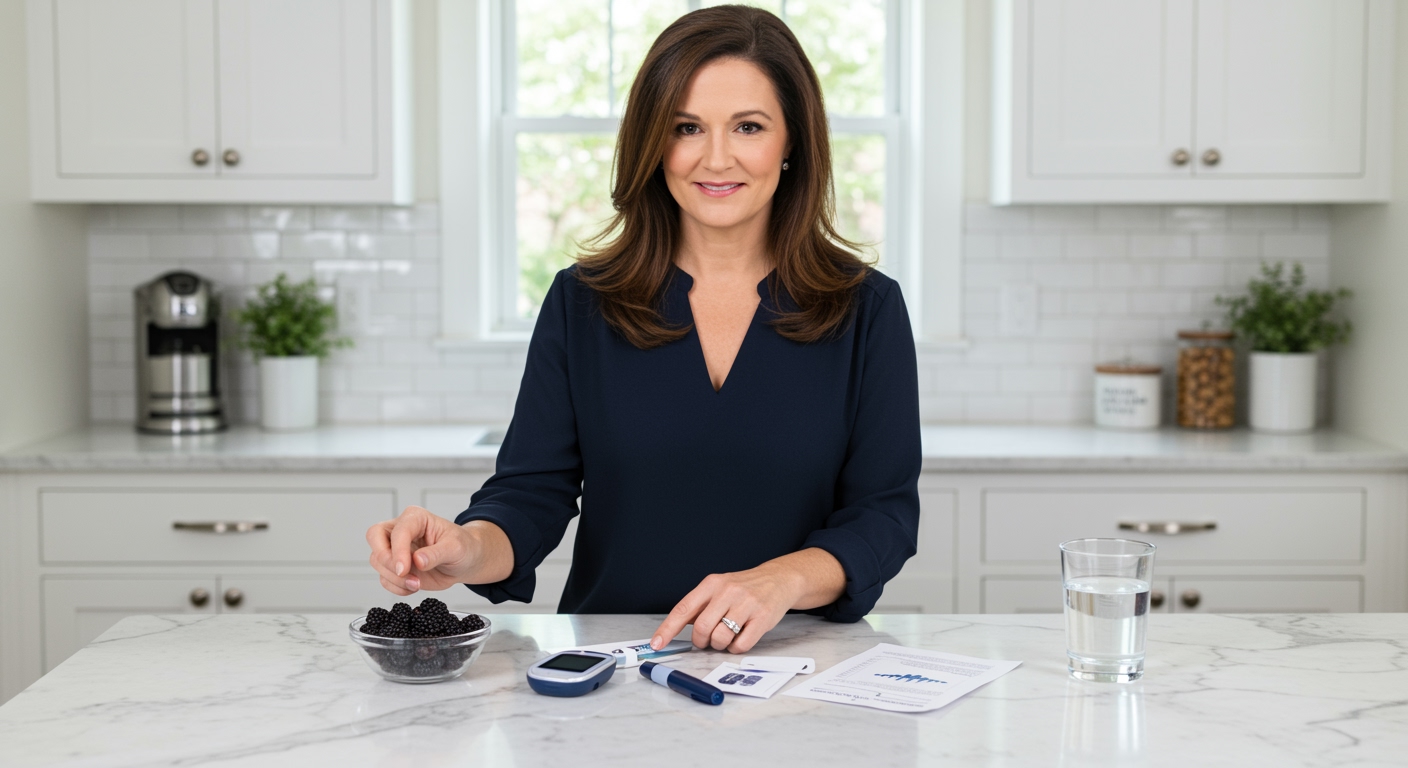✪ Key Takeaway: Blackberries are excellent for diabetes with low glycemic index and fiber that helps control blood sugar.
Introduction
Your doctor just told you that you have diabetes and suddenly every food feels like a potential enemy.
You might be wondering if those delicious blackberries sitting in your refrigerator are now off-limits because of their natural sweetness.
Hi, I’m Abdur, your nutrition coach and today I’m going to explain exactly how blackberries affect your blood sugar and why they might be one of the best fruits you can eat for diabetes management.
What Makes Blackberries Different From Other Fruits?
Blackberries have a glycemic index of only 25, which places them in the low category for blood sugar impact.
This means they cause a much slower and gentler rise in blood glucose compared to high-glycemic fruits like watermelon or pineapple.
The fiber content in blackberries is exceptionally high at 7.6 grams per cup, which acts like a natural brake on sugar absorption.
When you eat blackberries, the fiber forms a gel-like substance in your digestive tract that slows down the movement of glucose into your bloodstream.
This process happens at the cellular level where fiber interferes with the enzymes that break down carbohydrates, creating a more gradual glucose release.
The anthocyanins in blackberries also play a crucial role by improving insulin sensitivity and helping your cells respond better to insulin signals.
Research shows that these powerful antioxidants can actually enhance glucose uptake by muscle cells while reducing glucose production in the liver.
✪ Pro Tip: Eat blackberries with a small amount of protein or healthy fat to further slow sugar absorption.
How Much Can You Safely Eat?
A safe serving size for diabetics is three-quarters of a cup of fresh blackberries, which contains about 11 grams of carbohydrates.
This portion provides significant nutritional benefits without causing dramatic blood sugar spikes in most people with diabetes.
The carbohydrate counting method suggests that this serving equals about one carbohydrate exchange, making it easy to fit into your meal planning.
Your individual tolerance may vary based on factors like your current blood sugar control, medication timing, and overall meal composition.
The best approach is to test your blood sugar before eating blackberries and then again 1-2 hours afterward to see how your body responds.
Most people find that their blood sugar rises by only 20-30 mg/dL after eating this portion, which is considered a mild response.
If you want to eat more than three-quarters of a cup, consider spreading the portions throughout the day rather than consuming them all at once.
✪ Fact: Frozen blackberries have the same glycemic impact as fresh ones and retain most of their fiber content.
When Is The Best Time To Eat Them?
The timing of when you eat blackberries can significantly impact their effect on your blood sugar levels.
Eating blackberries as part of a balanced meal rather than as a standalone snack helps minimize blood sugar spikes.
The presence of protein and healthy fats in your meal slows down gastric emptying, which means the sugars from blackberries enter your bloodstream more gradually.
Morning consumption with breakfast is often ideal because your insulin sensitivity is typically higher after an overnight fast.
This natural circadian rhythm means your body is better equipped to handle carbohydrates earlier in the day.
Avoid eating blackberries late in the evening, especially if you take long-acting insulin, as this can interfere with your overnight blood sugar control.
If you exercise regularly, consuming blackberries about 30-60 minutes before physical activity can provide sustained energy without causing problematic blood sugar fluctuations.
✪ Note: Always check your blood sugar if you feel symptoms of hypoglycemia after eating blackberries with diabetes medication.
What About Blackberry Products And Juices?
Blackberry juice and processed blackberry products have a completely different impact on blood sugar compared to whole berries.
When blackberries are juiced, the fiber is removed, which eliminates the natural mechanism that slows sugar absorption.
This means blackberry juice can cause rapid blood sugar spikes similar to other fruit juices, making it unsuitable for most diabetics.
Commercial blackberry products like jams, jellies, and syrups contain added sugars that can send blood glucose levels soaring.
Even sugar-free blackberry products often contain artificial sweeteners that may affect gut bacteria and potentially influence glucose metabolism.
Dried blackberries are concentrated sources of natural sugars with reduced water content, making them much higher in carbohydrates per serving.
The safest approach is to stick with fresh or frozen whole blackberries and avoid all processed forms if you want to maintain stable blood sugar control.
✪ Pro Tip: Make your own blackberry smoothie with whole berries, unsweetened almond milk, and a scoop of protein powder.
The Bottom Line
Blackberries are not only safe for diabetics but can actually be beneficial for blood sugar management when consumed in appropriate portions.
The key to diabetes management is not avoiding all sweet foods, but choosing the right ones that work with your body instead of against it.
I would love to hear about your experience with blackberries and diabetes management, so please share your thoughts, questions, or success stories in the comments below.
References
At NutritionCrown, we use quality and credible sources to ensure our content is accurate and trustworthy. Below are the sources referenced in creating this article:
- Signos: Blackberry Glycemic Index
- PMC: Berries and Diabetes Management
- PMC: Anthocyanins and Glucose Metabolism
- Canadian Insulin: Blackberries and Diabetes





